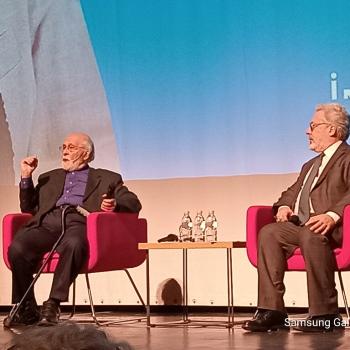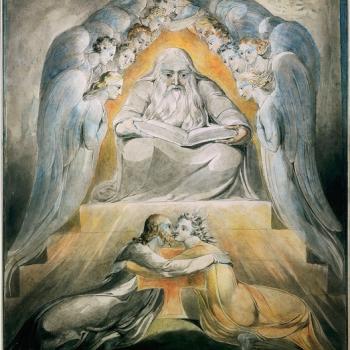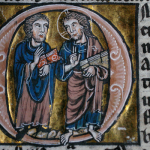
J.R.R. Tolkien, who worked on a translation of the book of Jonah for the Jerusalem Bible, found much in the text worthy of his own personal exploration and consideration. One point which he found important is the way God and God’s mercy often is not properly understood by those who are authentically called by God to do some work in the world. Even prophets, while inspired, are human, and their human misunderstanding can and often does get in the way of what God wants to happen. This, after all, is what happened to Jonah, and if it can happen to him, it can happen to others who have an authentic charism, an authentic mission in the church, including clergy. Everyone, especially those with such a charism, must come to know themselves and their limitations; they must not presume too much when they find they are given some authority in the church or in the world. They certainly must not try to presume to tell God to judge and condemn those whom God wants to save, which of course, is everyone:
Incidentally, if you ever look at the Old Testament, and look at Jonah, you’ll find that the ‘whale’ — it is not really said to be a whale but a big fish – is quite unimportant. The real point is that God is much more merciful than ‘prophets’, is easily moved by penitence, and won’t be dictated to even by high ecclesiastics whom he has himself appointed.[1]
To be sure, Tolkien recognized that God’s mercy is related to God’s judgement; the judgment which came upon Nineveh was dispensed with when the people of Nineveh (and all the creatures within) repented (and then fasted as a sign of their penitence). God’s judgment, which Jonah declared, was not meant to give a final say of what would happen to Nineveh, but only what could happen if they did not change. It was meant to help them change, which is what Jonah did not understand; similarly, it is something which many Christians have yet to understand, especially those who have embraced some form of legalism, because such legalism does not understand economia and the way God can and will transcend such judgments. Thus, God’s mercy does not serve sin and help is flourish, but rather, the reverse; it is what helps sin to truly come to an end. It gives people the grace they need to be set free from sin and the judgment which comes upon it. If all that is possible is that those who sin will be condemned without mercy, without any chance of change, sin will remain in control and have the last say. But that is not what Christianity teaches; rather, sin is overcome by Christ. He took up the sin of the world on his shoulders, so that, through his death, he could deposit it all at the edge of being, in the abyss, so it is has been put into its proper place and order can be restored in creation.
Sin is unnatural, a corruption of being; it suggests some form of the truth, but it takes and distorts the truth, corrupting it, turning it into a lie, a lie which Christ denounces: “To be merciful does not mean to justify falsehood and sin. It does not mean to be tolerant of foolishness and evil. It does not mean to overlook injustice and iniquity. God is not this way, and does not do this.”[2] What we must not do is confuse the judgment of sin as the final declaration of what will happen to the person trapped by it. Jonah had that confusion, and it led him to rebel against God and try to resist his prophetic ministry, a ministry which had him declare the judgment God made concerning Nineveh’s sin. He did not understand that with the judgment, there could be a greater declaration made by God, a declaration of mercy. God is willing to free those who humble themselves and seek to change their ways. God loves humanity, including sinners, and has compassion on them all. We, then, should seek such mercy, allowing it to change us to that we find ourselves reflecting such mercy in all we do; it is what will make us empathetic with others, especially those struggling with sin:
To be merciful means to have compassion on evil-doers and to sympathize with those who are caught in the bonds of sin. It means to forego every self-righteousness and every self-justification in comparison with others. It means to refuse to condemn those who do wrong, but to forgive those who harm and destroy, both themselves and others. It is to say with utter seriousness, “forgive us our trespasses as we forgive those who trespass against us” (Mt 6.12).[3]
When he started his prophetic mission, Jonah did not understand divine forgiveness; he only knew the judgment which God had made. He was frightened. He did not want to speak. Likely, he knew himself and his own sin, and was afraid that he would hear God’s condemnation coming down upon himself. Eventually, however, he would learn. When he tried to flee from God, when he tried to abandon his mission and not go to Nineveh, he got caught up in his own sin and imprisoned by it. That is, he was swallowed up by the “whale,” the whale which allegorically represents hell itself. In it, he experienced a kind of death and destruction, and only when he repented did he find himself forgiven and freed from the “whale”; then, it is as if he were raised from the dead and turned into a new man. In that way, he was taught that God’s judgment makes way for mercy, and that the condemnation made in the judgment was conditional. This is why the fate of Nineveh changed. The conditions changed. Jonah’s personal story therefore is similar to and reflects the story of the people of Nineveh. Jonah and the people of Nineveh both serve as a sign, the sign of Jesus, the sign of God’s forgiveness and grace which will be offered to all and can free everyone from the hell of sin. Let us heed the lesson and not be like Jonah, standing only on the judgment and condemnation of sin; instead, let us look to the sign of Jonah and the hope it provides, the hope that God’s mercy can come upon all, including and especially those who have received some sort of judgment from God. The warnings we read of those who might be condemned to hell must be seen in this light: they are conditional judgments. We do not know the end result of such conditions. We do not know if anyone will be eternally lost. This is why we can and should hope that all will be saved, which is not to say the process of salvation will be easy (as the story of Jonah demonstrates).
[1] J.R.R. Tolkien, The Letters of J.R.R. Tolkien. Revised and Expanded Edition. Ed. Humphrey Carpenter and Christopher Tolkien (Broadway, NY: William Morrow, 2023), 370 [Letter 196a to Michael George Tolkien].
[2] Thomas Hopko, The Orthodox Faith. Volume 4: Spirituality (Yonkers, NY: St Vladimir’s Seminary Press, 1981; rev. ed. 2016), 44.
[3] Thomas Hopko, The Orthodox Faith. Volume 4, 44.












